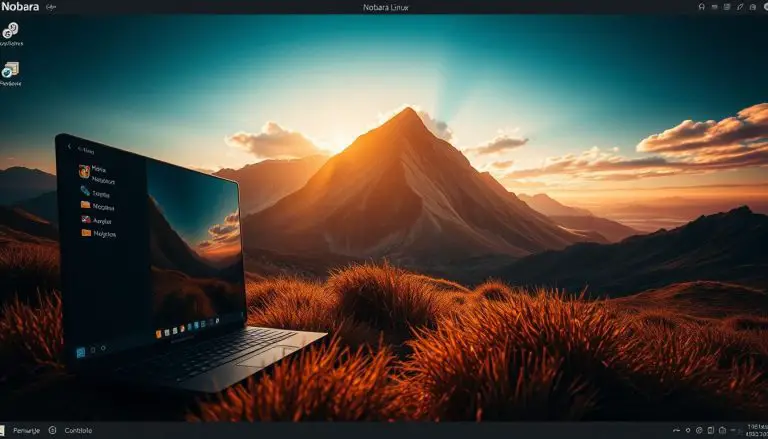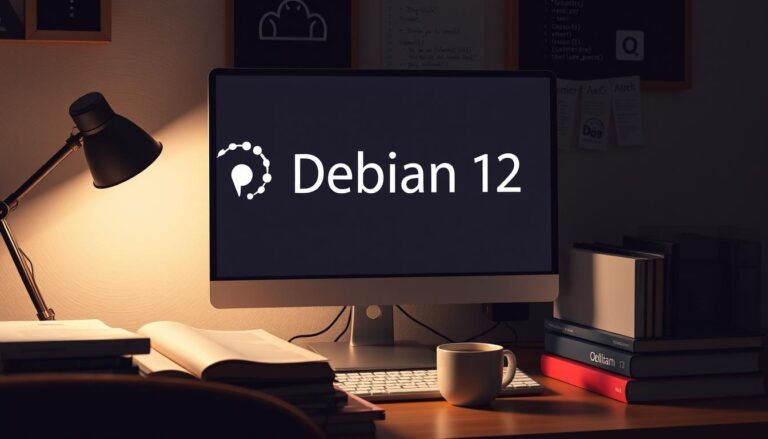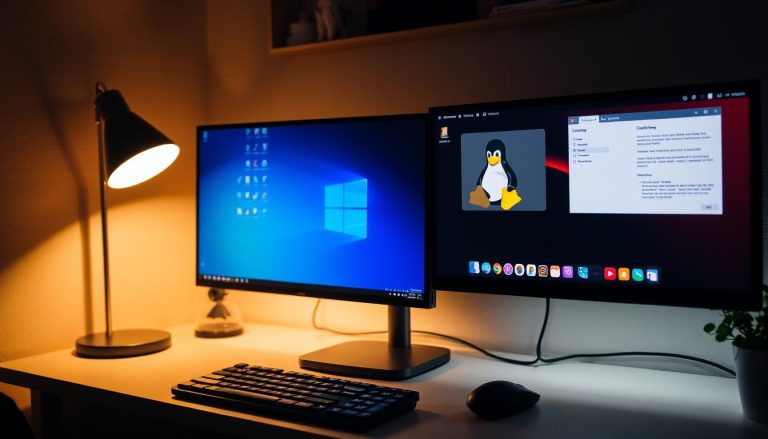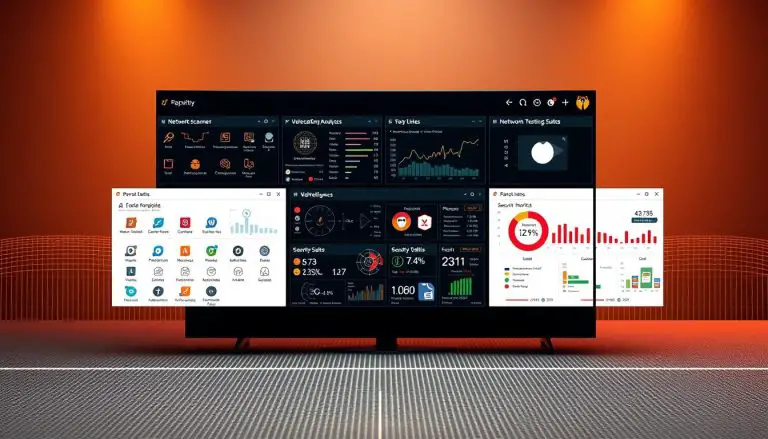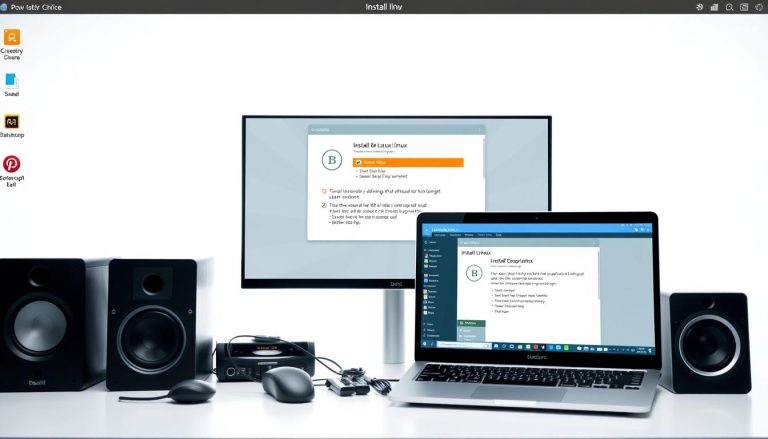Discover the Best Linux Distro for Gaming Performance
Gaming on alternative platforms has transformed dramatically in recent years. What was once considered a niche pursuit has become a viable option for enthusiasts. Nearly 80% of popular Windows titles now run seamlessly on open-source systems, thanks to compatibility tools like Proton and Wine. The Steam Proton project represents the most significant advancement, allowing players to enjoy Windows-exclusive games on alternative desktops. This evolution means you’re no longer limited by your choice of operating system when pursuing your gaming passions.
With hundreds of linux distros available, selecting the right one becomes critical. Not every distribution offers the same level of optimization for demanding applications. We examine how specialized builds can eliminate hours of manual configuration.
Our comprehensive guide explores 13 specialized options that provide out-of-the-box enhancements. These range from mainstream choices to specialty builds designed specifically for entertainment purposes. Each selection undergoes rigorous testing for real-world performance.
Key Takeaways
- Modern compatibility tools have made gaming on alternative platforms more accessible than ever
- Steam’s Proton technology enables seamless play of Windows titles
- Specialized distributions eliminate complex setup processes
- Hardware compatibility and driver support vary significantly between options
- Pre-installed gaming tools can dramatically improve the user experience
- Community support plays a vital role in troubleshooting and optimization
Introduction to Linux Gaming and Distribution Diversity
The landscape of playing games on open-source platforms has undergone remarkable changes. Historically, these systems faced significant hurdles in the entertainment space. Limited availability of titles designed specifically for the platform created barriers.
An Overview of the Linux Gaming Landscape
We examine how compatibility layers have transformed accessibility. Major publishers now regularly bring popular titles to the ecosystem. Companies like Feral Interactive have been instrumental in this shift.
The perception that serious entertainment required specific operating systems is fading. Thousands of native titles are now available. Compatibility tools dramatically expand the library beyond native offerings.
Why Consider a Linux Distro for Your Gaming Setup?
There are philosophical and practical motivations for this choice. Open-source principles, system customization, and privacy benefits appeal to many users. Eliminating licensing costs represents another advantage.
The diversity of available operating system variations offers flexibility. However, this variety can create confusion for newcomers. Distribution selection matters significantly for optimal performance.
Specialized builds eliminate complex setup processes. They provide optimized configurations and pre-installed tools. This makes the platform accessible to users new to the ecosystem.
Why Linux Gaming Has Evolved Over Time
A quiet revolution in compatibility layers has dramatically expanded the software library available to users. We’ve witnessed remarkable progress in making Windows titles accessible on alternative platforms. This evolution stems from both software innovations and hardware advancements.
Impact of Steam Proton and Compatibility Tools
The steam proton project represents a breakthrough in compatibility technology. Built upon Wine architecture, this tool specifically optimizes windows games linux compatibility. It translates DirectX calls to Vulkan, delivering impressive performance.
Nearly 80% of popular titles now run seamlessly through this compatibility layer. Tools like Lutris and PlayOnLinux extend these capabilities beyond Steam. They enable access to games from Epic Games Store, GOG, and other platforms.
Advances in Hardware and Driver Support
Modern graphics drivers have seen substantial improvements. Both AMD and Intel now provide excellent open-source support for their hardware. NVIDIA has also enhanced its proprietary driver offerings.
Current distributions ship with updated Mesa drivers that include cutting-edge features. This linux improved ecosystem ensures robust graphics performance. The combination of mature software tools and hardware support creates a compelling gaming environment.
Key Considerations When Choosing a Gaming Linux Distro
Critical evaluation criteria emerge when configuring a system specifically designed for interactive entertainment. We examine the fundamental factors that influence performance and accessibility.
System Resources and Performance Requirements
Every computing resource matters when running demanding applications. A lightweight operating system maximizes available RAM and CPU cycles for smooth gameplay.
The desktop environment choice significantly impacts performance. Options like KDE Plasma or Xfce consume fewer resources than feature-rich alternatives. This optimization becomes crucial on modest hardware configurations.
Ease of Installation and User Experience
Installation simplicity matters greatly, especially for newcomers. Distributions with intuitive graphical installers and automatic hardware detection reduce setup barriers.
The overall user experience extends beyond initial installation. Essential gaming tools should be readily available in official repositories. This accessibility minimizes troubleshooting requirements.
We recommend evaluating driver availability for your specific GPU hardware. Straightforward installation processes save considerable time and frustration during system configuration.
Choosing the Best Linux Distro for Gaming
Our curated selection focuses on delivering immediate, high-performance experiences. We’ve filtered options that excel with modern hardware and simplify setup.
Any of the available linux distros can run games with enough tweaking. Our list highlights those requiring minimal configuration.
We evaluate each option on key criteria. This includes out-of-the-box hardware compatibility and pre-installed tools. Update frequency for graphics drivers and community support quality are also critical.
Highlighting Popular Choices and Their Strengths
Our recommendations are organized into logical groups. This helps you find the perfect match for your skill level and hardware.
Mainstream general-purpose systems offer a balanced approach. They provide excellent stability and extensive documentation. These are ideal starting points for those new to this ecosystem.
Rolling release models provide cutting-edge performance. They are excellent for newer graphics cards. You benefit from the latest kernel versions and Mesa drivers.
Specialty builds are crafted specifically for entertainment. They offer console-like experiences. These optimized gaming systems maximize resources for your games.
Our comprehensive list ensures a suitable option for every user. Whether you seek maximum performance or straightforward setup, you’ll find it here.
Exploring Mainstream Options: Pop!_OS and Ubuntu
When setting up a system for entertainment, mainstream distributions offer a compelling blend of stability and ease of use. We will look at two popular choices that serve as excellent starting points.
Both systems provide a solid foundation. They are built to minimize initial setup time and complexity.
Pop!_OS: Optimized for NVIDIA/AMD and Ready for Gaming
The Pop!_OS distribution by System76 is engineered for a seamless experience. A key advantage is its dedicated ISO files for NVIDIA and AMD graphics cards. This approach ensures the correct drivers are installed immediately.
Your system is ready to go out of the box. The Pop!_Shop offers one-click installation for essential tools like Steam and Lutris. This Pop!_OS setup simplifies getting your favorite windows games running.
Performance tweaks are included by default. The Pop!_OS System76 team integrates optimizations that benefit modern games.
Ubuntu: Community Support and Adaptability for Gamers
Ubuntu remains a top choice for newcomers. Its massive community is its greatest asset. If you encounter an issue, solutions are readily available in forums and guides.
This extensive support network makes troubleshooting straightforward. You can easily add the latest graphics drivers and gaming software. The system’s stability is ideal for a reliable desktop environment.
While it may require a bit more setup than Pop!_OS, Ubuntu’s adaptability is unmatched. It provides a robust base you can customize to your preferences.
Lightweight Alternatives: Kubuntu and Linux Mint
Optimizing system resources through carefully selected desktop environments can significantly enhance gaming performance. We examine two excellent options that prioritize efficiency without sacrificing functionality.
Kubuntu provides an official Ubuntu variant featuring the KDE Plasma desktop. Despite its modern appearance, this environment consumes fewer resources than standard GNOME interfaces. This efficiency leaves more RAM and CPU cycles available for demanding games.
The KDE Plasma desktop offers extensive customization options and built-in performance monitoring tools. Many users prefer this environment for its responsive behavior on systems with 4-8GB of RAM. You maintain full access to Ubuntu’s software repositories and graphics drivers.
Linux Mint delivers another compelling lightweight distribution with multiple desktop choices. The Cinnamon, MATE, and Xfce editions all emphasize resource efficiency while providing familiar workflows. This makes the transition from Windows particularly smooth for new users.
Linux Mint distinguishes itself with five years of support compared to three years for some Ubuntu variants. This extended update period ensures stability for carefully configured gaming setups. The distribution’s software manager simplifies installing and removing applications.
Both options excel at delivering Windows-like desktop experiences with excellent compatibility. They represent ideal choices for maximizing performance on older hardware or systems with limited resources.
Rolling Release Distributions: Manjaro and Garuda Linux
Continuous software updates provide a distinct advantage for enthusiasts who demand the latest hardware support. Unlike traditional fixed-release models, rolling release distributions deliver updates as they become available.
Benefits of a Rolling Release Model in Gaming
This approach ensures immediate access to cutting-edge kernel versions and graphics drivers. Users never wait for major distribution upgrades to benefit from performance improvements.
The model particularly excels with modern GPU hardware. Newer graphics cards often require the latest Mesa drivers for optimal functionality. This makes rolling release systems ideal for demanding applications.
Key Performance Enhancements for Newer GPUs
Manjaro represents the most accessible Arch Linux–based option. It simplifies the powerful Arch Linux foundation while maintaining the rolling release advantage. The system includes pre-configured Steam and Wine options.
Garuda Linux takes optimization further with aggressive system tweaks. It features ZRAM compression and performance profiles specifically designed for gaming. The distribution comes fully equipped with essential tools.
Both systems demonstrate how based on Arch architectures can deliver exceptional gaming experiences. They provide immediate access to new technologies that enhance Windows titles compatibility.
Specialty Distros Crafted Specifically for Gaming
For users seeking console-like simplicity, purpose-built systems offer turnkey solutions requiring minimal configuration. These specialized builds prioritize entertainment over general computing functionality.
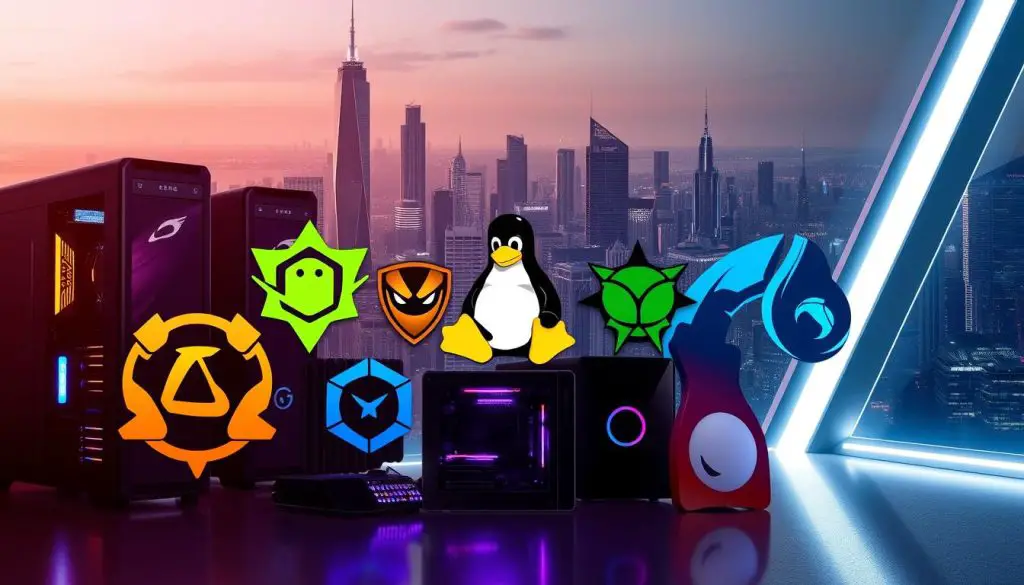
Distro Customizations and Preinstalled Gaming Tools
Drauger OS represents a focused Ubuntu-based approach to optimized gaming. This operating system strips away productivity software to dedicate maximum resources to entertainment. It supports both keyboard/mouse and controller setups right out of the box.
Bazzite builds upon Fedora’s foundation with expanded hardware compatibility. The system automatically detects devices like Steam Deck and includes essential tools like controller support. Comprehensive platform integration covers multiple storefronts beyond Steam.
ChimeraOS transforms standard hardware into dedicated entertainment consoles. The interface prioritizes controller navigation and provides immediate access to your library. This represents the ultimate optimized gaming experience for living room setups.
These specialized distro options excel at delivering focused gaming environments. They sacrifice everyday functionality to provide unparalleled performance for dedicated entertainment systems.
Retro Gaming on Linux with Batocera.linux and Lakka OS
Classic gaming enthusiasts can rediscover their favorite titles through specialized operating systems designed specifically for emulation. These platforms transform standard computers into dedicated machines for vintage entertainment.
Emulation Performance and Console Feel
Batocera.linux offers a comprehensive solution for retro gaming enthusiasts. It supports emulation of classic systems like Atari 2600, Super Nintendo, and SEGA Genesis. The platform runs entirely from USB storage without hard drive installation.
Users can carry their complete library and boot it on compatible hardware. The system includes Kodi Media Center for dual-purpose entertainment. This makes it ideal for living room setups where users want to play games and enjoy media.
Lakka OS provides a lightweight alternative built on RetroArch technology. It creates an authentic gaming console experience with controller-focused navigation. The system automatically recognizes joypads and supports advanced features.
Players benefit from save states, netplay for multiplayer, and rewind functionality. Shader support creates authentic CRT display effects. Both platforms deliver specialized environments perfect for dedicated retro gaming stations.
These systems excel at providing authentic console experiences with modern conveniences. They represent ideal choices for arcade cabinet builds or nostalgia-focused setups where users want to play games from multiple generations.
Emerging Distros: CachyOS and PikaOS for Next-Gen Gaming
Emerging platforms are redefining what’s possible for interactive entertainment on alternative systems. We examine two promising options that combine cutting-edge performance with user-friendly design.
Preinstalled Gaming Tools and Custom Kernel Optimizations
CachyOS represents a significant advancement in optimized gaming experiences. This Arch-based system includes Steam, Lutris, and custom Proton-CachyOS right out of the box.
The distribution features custom-compiled kernels with automatic CPU prioritization. GameMode support ensures smooth performance without manual configuration. Advanced graphics technologies like DLSS and ray tracing are pre-configured.
CachyOS offers a specialized edition for portable devices. It works seamlessly with the Steam Deck and similar handheld consoles. This provides console-like experiences on mobile hardware.
PikaOS delivers a modern, lightweight alternative for entertainment. It comes with essential tools like Steam, Lutris, and Heroic Games Launcher. The rolling release model ensures access to latest updates.
Both systems demonstrate how new linux distributions are evolving. They make advanced technologies accessible to all users. These platforms eliminate complex setup processes.
You can use these systems for various entertainment things. They support a wide range of games linux titles through compatibility layers. The software integration is comprehensive and user-friendly.
Building and Customizing Your Linux Gaming Experience
Once you’ve selected your ideal platform, the next step involves installing the essential software that powers your entertainment library. The core tools are remarkably consistent across different operating system variants.
This consistency gives you tremendous flexibility. You can choose a distribution based on your preferences for the desktop environment or community support, knowing you can still access a wide range of titles.
Essential Software: Steam, Lutris, and Compatibility Layers
Steam serves as the foundational platform. Its native client includes the Proton compatibility layer, which is crucial for running a vast library of windows games linux titles. This integration means most popular game titles work seamlessly.
For managing a wide range of titles from different stores, Lutris is an invaluable tool. It automates the setup for platforms like Steam, Epic Games Store, and GOG. This simplifies the process for the user significantly.
Underlying these applications are compatibility technologies like Wine and Proton. They translate Windows instructions so games linux can run. Performance often matches the original platform when using the latest graphics drivers.
Supplementary tools enhance the experience further. GameMode optimizes system resources, while MangoHud provides real-time performance data. These applications work together to create a robust gaming system on any mainstream distribution.
Conclusion
Choosing an operating system for entertainment no longer means compromising on performance or game selection. The tools available today, like Steam Proton and Lutris, make a vast library of titles playable. You can install these on any mainstream distribution to create a powerful gaming machine.
The real difference for the user is the amount of setup required. Options like Pop!_OS or Garuda Linux provide an optimized experience right away. Others might need more configuration to play games seamlessly.
Your ideal choice depends on your hardware and how much time you want to invest. We encourage you to test different systems before installing. The community continues to drive impressive progress, ensuring this platform remains a strong contender for any enthusiast.
FAQ
Can I play my Windows games on a Linux distribution?
What are the main advantages of using a rolling release distribution like Arch Linux or Manjaro for gaming?
How does Pop!_OS stand out for gaming compared to other options?
Is a lightweight desktop environment important for gaming performance?
What makes a distribution like Garuda Linux or CachyOS specifically good for gaming?
Can I turn my computer into a retro gaming console using Linux?
- About the Author
- Latest Posts
Janina is a technical editor at Text-Center.com and loves to write about computer technology and latest trends in information technology. She also works for Biteno.com.

